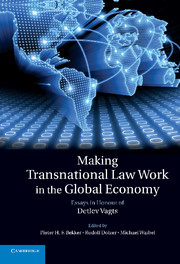Book contents
- Frontmatter
- Contents
- List of contributors
- Foreword: the transnationalism of Detlev Vagts
- List of cases cited
- List of abbreviations and acronyms
- Introduction: a Festschrift to celebrate Detlev Vagts' contributions to transnational law
- 1 Detlev Vagts and the Harvard Law School
- 2 Constructing and developing transnational law: the contribution of Detlev Vagts
- I International law in general
- II Transnational economic law
- 14 Sovereignty-plus in the era of interdependence: toward an international convention on combating human rights violations by Transnational Corporations
- 15 The noisy secrecy: Swiss banking law in international dispute
- 16 Not-for-profit organisations, conflicts of laws and the right of establishment under the EC Treaty
- 17 The meaning of ‘investment’ in the ICSID Convention
- 18 Toward a proper perspective of the private company's distinctiveness
- 19 Administrative law and international law: the encounter of an odd couple
- 20 Making transnational law work through regime-building: the case of international investment law
- 21 Creditor protection in international law
- 22 Stability, integration and political modalities: some American reflections on the European project after the financial crisis
- III Transnational lawyering and dispute resolution
- Bibliography of Detlev Vagts
- Index
18 - Toward a proper perspective of the private company's distinctiveness
from II - Transnational economic law
Published online by Cambridge University Press: 17 November 2010
- Frontmatter
- Contents
- List of contributors
- Foreword: the transnationalism of Detlev Vagts
- List of cases cited
- List of abbreviations and acronyms
- Introduction: a Festschrift to celebrate Detlev Vagts' contributions to transnational law
- 1 Detlev Vagts and the Harvard Law School
- 2 Constructing and developing transnational law: the contribution of Detlev Vagts
- I International law in general
- II Transnational economic law
- 14 Sovereignty-plus in the era of interdependence: toward an international convention on combating human rights violations by Transnational Corporations
- 15 The noisy secrecy: Swiss banking law in international dispute
- 16 Not-for-profit organisations, conflicts of laws and the right of establishment under the EC Treaty
- 17 The meaning of ‘investment’ in the ICSID Convention
- 18 Toward a proper perspective of the private company's distinctiveness
- 19 Administrative law and international law: the encounter of an odd couple
- 20 Making transnational law work through regime-building: the case of international investment law
- 21 Creditor protection in international law
- 22 Stability, integration and political modalities: some American reflections on the European project after the financial crisis
- III Transnational lawyering and dispute resolution
- Bibliography of Detlev Vagts
- Index
Summary
Introduction
Leafing through a dog-eared copy of his book at the library of the Institute of Advanced Legal Studies, Lagos, Nigeria, I got acquainted with Professor Detlev Vagts long before I met him. I got acquainted with him not in transnational law, the field in which he has made the greatest impact, but rather in the field of corporate law, where he also has left his mark. Such is the range of his scholarly reach. It is, therefore, fitting that I celebrate his contributions to the scholarly enterprise with an examination of aspects of company law in a comparative context.
A ‘private company’ is usually identified by reference to certain distinctive features, which typically include express restrictions on key aspects such as the size of its membership, the transferability of its shares and invitations to the public to subscribe its securities. These sorts of restrictions may currently be found in section 755 of the Companies Act 2006 in England and Article 26(5) of the Model Articles for Private Companies, as well as in section 22 of the Companies and Allied Matters Act (hereafter, ‘CAMA’), the basic legislation governing companies in Nigeria. The restriction on invitations or offers to the public to subscribe its securities is thought to be the basic distinguishing feature of the private company in English and Nigerian law. A ‘public company’, on the other hand, has none of these restrictions.
- Type
- Chapter
- Information
- Making Transnational Law Work in the Global EconomyEssays in Honour of Detlev Vagts, pp. 357 - 379Publisher: Cambridge University PressPrint publication year: 2010



